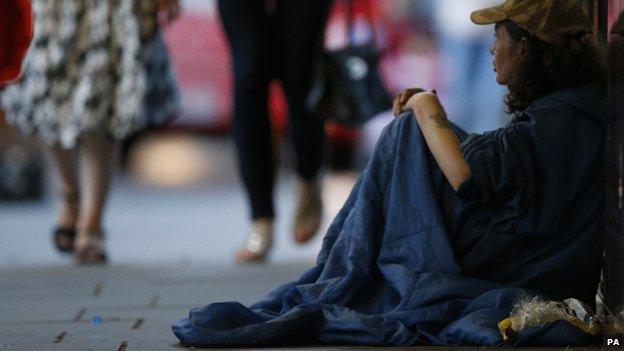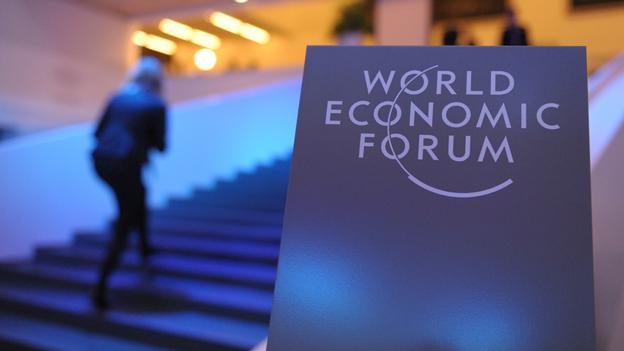Why extreme inequality hurts the rich
- Published
- comments

"We could have developed a vaccine for Ebola years ago if we had chosen to allocate the resources to the appropriate research".
That is what a senior and respected medical scientist, a man who would be seen as a world authority on such matters, said to me.
So why wasn't the cure found?
The relevant research didn't happen because Ebola was seen for a long time to be a disease only of the poor, especially in Africa - and therefore the giant pharmaceutical manufacturers couldn't see how to make big money out of an Ebola medicine.
Today of course it is clear that Ebola is a global threat - and hence there is a mad rush to find a treatment.
What the preventable tragedy of Ebola shows is that in a globalised world the interests of rich and poor are frequently the same - although it is hard for businesses to recognise this mutuality of interest when driven to make short-term profits.
This solidarity between those with least and those (us) with most is also lost when governments are under pressure from voters to use tax revenues only in ways that demonstrably benefit a domestic population.
Perhaps the most important point is that when decisions about who gets what or how investment funds are allocated are left to markets, the outcome may seem to benefit only the rich but the consequence may end up hurting rich and poor alike.
Which is a powerful argument for why the widening gap between the rich and poor, in wealth and income, is bad for everyone - even the super wealthy, unless that is they never want to leave their fortified, hermetically sealed, lavishly appointed bunkers.
The point is that the operation of markets in the circumstances of modern globalisation both leads to extreme concentrations of wealth and increasingly irrational outcomes when it comes to the dispersion of funds to combat threats or promote public goods.
It is one of the reasons why the likes of the IMF and senior politicians of left and right are no longer blithely regarding the widening gap between rich and poor as a perhaps irksome but nonetheless necessary spin-off of the greater imperative of promoting growth.
Partly it is just the jaw-dropping pace and scale of how a century of narrowing inequalities has gone into dramatic reverse.
To be clear, Oxfam's claim today, external that by 2016 the richest 1% could own as much or the same as the bottom 99% is not wildly implausible.
Credit Suisse's Global Wealth Report for 2014 showed that the 0.7% of the world's people with assets more than $1m controlled 44% of all the world's wealth.
And recent influential research by Emmanuel Saez and Gabriel Zucman, of the University of California, Berkeley and the LSE respectively, shows that America's top 0.1% - or 160,000 families who are worth $73m each on average - hold more than a fifth of all US wealth, the same proportion as the bottom 90% of America's people.
There are all sorts of reasons why such increases in inequality are troubling, and not just for those at the bottom of the income and wealth pyramid.
One is that aspirational people on lower incomes have massive incentives to take on too-great debts to support their living standards - which exacerbates the propensity of the economy to swing from boom to financial-crisis bust.
Another is that the poor in aggregate spend more than the rich (there are only so many motor cars and yachts a billionaire can own, so much of the super-rich's wealth sits idle. as it were), and therefore growth tends to be faster when income is more evenly distributed.
So President Obama's State of the Union address, which is expected to contain a proposal, external to tax the assets of the wealthy, perhaps should be seen as a belated attempt to promote economic and social stability that would benefit even the wealthy - who will nonetheless attempt to stymie him in Congress.
As it happens I am in the process of finishing a two-part Radio 4 documentary about all of this, due for broadcast in a few weeks.

The subject of wealth inequality may loom larger at the World Economic Forum in Davos
And what is striking is the growing realisation - even by the extreme privileged, who are about to fly in their private jets to Davos to save the world from itself, at the annual gathering of the World Economic Forum - that it is no longer enough simply to argue that equality of opportunity is all that matters.
Or rather, there can be little equality of opportunity in a world where there is the kind of inequality of outcome we haven't seen since the early decades of the last century.